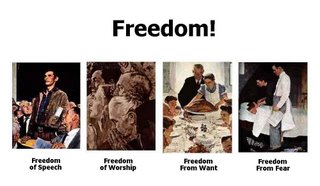Writtten by Michael E. O’Hanlon; who is a senior fellow at
the Brookings Institution. Kenneth M. Pollack is the director of
research at the Saban Center for Middle East Policy at Brookings.
VIEWED from Iraq, where we just spent
eight days meeting with American and Iraqi military and civilian
personnel, the political debate in Washington is surreal. The Bush
administration has over four years lost essentially all credibility.
Yet now the administration’s critics, in part as a result, seem unaware
of the significant changes taking place.
Here is the most
important thing Americans need to understand: We are finally getting
somewhere in Iraq, at least in military terms. As two analysts who have
harshly criticized the Bush administration’s miserable handling of
Iraq, we were surprised by the gains we saw and the potential to
produce not necessarily “victory” but a sustainable stability that both
we and the Iraqis could live with.
After the furnace-like heat,
the first thing you notice when you land in Baghdad is the morale of
our troops. In previous trips to Iraq we often found American troops
angry and frustrated — many sensed they had the wrong strategy, were
using the wrong tactics and were risking their lives in pursuit of an
approach that could not work.
Today, morale is high. The
soldiers and marines told us they feel that they now have a superb
commander in Gen. David Petraeus; they are confident in his strategy,
they see real results, and they feel now they have the numbers needed
to make a real difference.
Everywhere, Army and Marine units
were focused on securing the Iraqi population, working with Iraqi
security units, creating new political and economic arrangements at the
local level and providing basic services — electricity, fuel, clean
water and sanitation — to the people. Yet in each place, operations had
been appropriately tailored to the specific needs of the community. As
a result, civilian fatality rates are down roughly a third since the
surge began — though they remain very high, underscoring how much more
still needs to be done.
In Ramadi, for example, we talked with
an outstanding Marine captain whose company was living in harmony in a
complex with a (largely Sunni) Iraqi police company and a (largely
Shiite) Iraqi Army unit. He and his men had built an Arab-style living
room, where he met with the local Sunni sheiks — all formerly allies of
Al Qaeda and other jihadist groups — who were now competing to secure
his friendship.
the Brookings Institution. Kenneth M. Pollack is the director of
research at the Saban Center for Middle East Policy at Brookings.
VIEWED from Iraq, where we just spent
eight days meeting with American and Iraqi military and civilian
personnel, the political debate in Washington is surreal. The Bush
administration has over four years lost essentially all credibility.
Yet now the administration’s critics, in part as a result, seem unaware
of the significant changes taking place.
Here is the most
important thing Americans need to understand: We are finally getting
somewhere in Iraq, at least in military terms. As two analysts who have
harshly criticized the Bush administration’s miserable handling of
Iraq, we were surprised by the gains we saw and the potential to
produce not necessarily “victory” but a sustainable stability that both
we and the Iraqis could live with.
After the furnace-like heat,
the first thing you notice when you land in Baghdad is the morale of
our troops. In previous trips to Iraq we often found American troops
angry and frustrated — many sensed they had the wrong strategy, were
using the wrong tactics and were risking their lives in pursuit of an
approach that could not work.
Today, morale is high. The
soldiers and marines told us they feel that they now have a superb
commander in Gen. David Petraeus; they are confident in his strategy,
they see real results, and they feel now they have the numbers needed
to make a real difference.
Everywhere, Army and Marine units
were focused on securing the Iraqi population, working with Iraqi
security units, creating new political and economic arrangements at the
local level and providing basic services — electricity, fuel, clean
water and sanitation — to the people. Yet in each place, operations had
been appropriately tailored to the specific needs of the community. As
a result, civilian fatality rates are down roughly a third since the
surge began — though they remain very high, underscoring how much more
still needs to be done.
In Ramadi, for example, we talked with
an outstanding Marine captain whose company was living in harmony in a
complex with a (largely Sunni) Iraqi police company and a (largely
Shiite) Iraqi Army unit. He and his men had built an Arab-style living
room, where he met with the local Sunni sheiks — all formerly allies of
Al Qaeda and other jihadist groups — who were now competing to secure
his friendship.
Powered by ScribeFire.






No comments:
Post a Comment